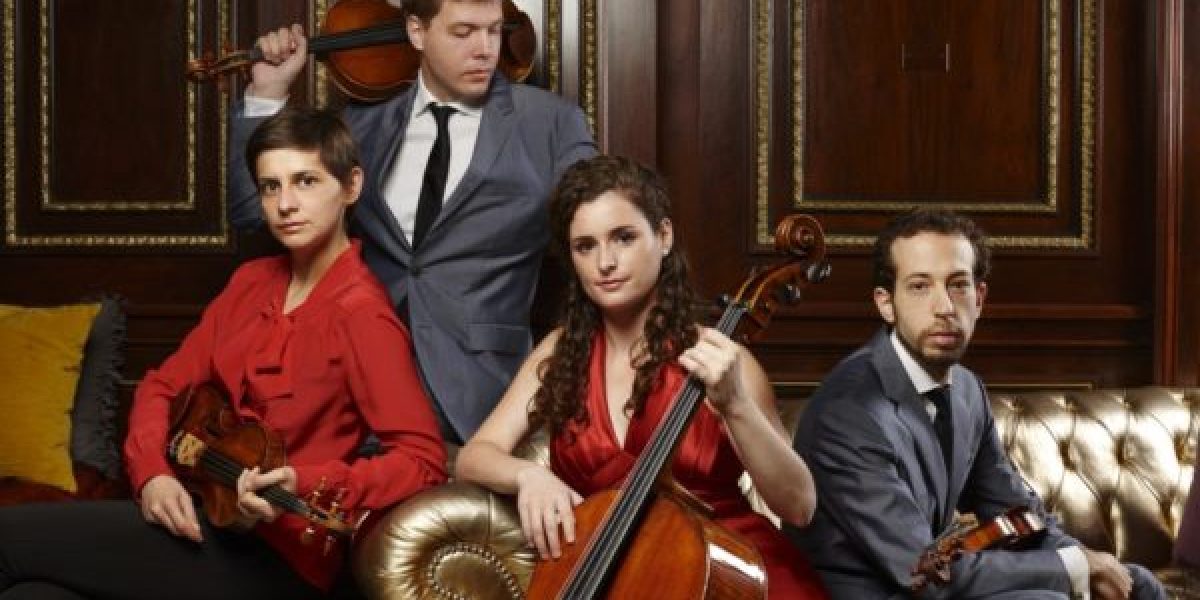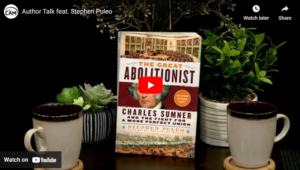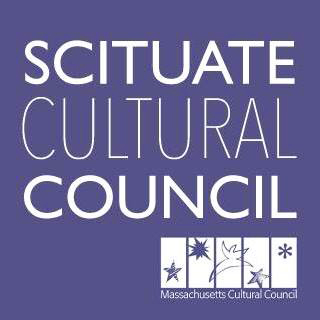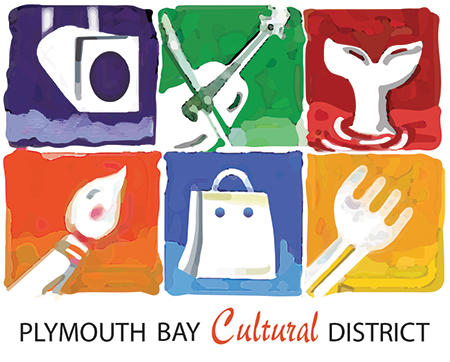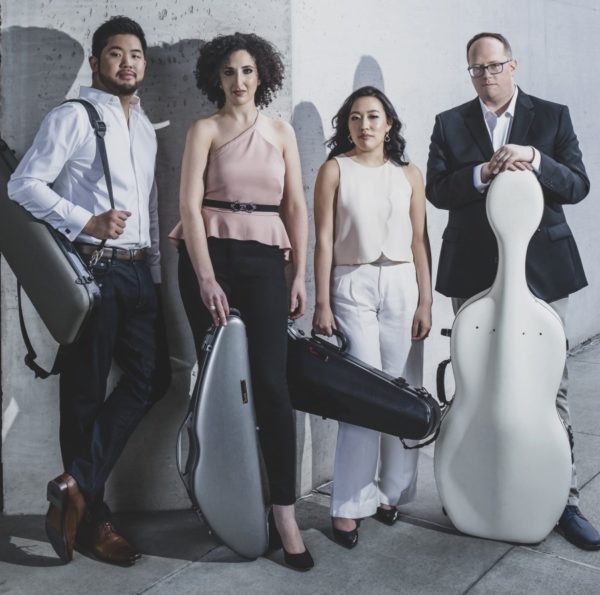
and cellist Jonathan Dormand. (Photo courtesy Cape Cod Chamber Music Festival)
The Verona and Ariel quartets believe in egoless collaboration
PROVINCETOWN INDEPENDENT – Abigail Rojansky, violist of the Verona String Quartet, remembers having an out-of-body experience while rehearsing for the quartet’s upcoming performance in Wellfleet. “I forgot that I existed,” she says. “It was the most extraordinary feeling. I was so engaged in the music we were making together.” When she became aware of the feeling, the moment ended.
The Verona will join the renowned Ariel Quartet on Friday, Aug. 5 to play Felix Mendelssohn’s Octet in E-flat Major, Op. 20, written in 1825, and Aaron Copland’s “Appalachian Spring” in its original scoring for 13 instruments, written in 1944. For the Copland, the two quartets will be joined by Tanya Dusevic Witek on flute, Jon Manasse on clarinet, Cynde Iverson on bassoon, Tony Falanga on double bass, and Elizabeth DiFelice on the piano. The concert, part of the Cape Cod Chamber Music Festival, is called “Miraculous Masterpieces.”
The two quartets haven’t played together before. Both participated in the New England Conservatory’s Professional String Quartet Program, but seven years apart. Both are quartets-in-residence: the Verona at Oberlin College and Conservatory and the Ariel at Cincinnati College-Conservatory of Music.
Playing chamber music can teach us a lot, says Rojansky. “It inspires a depth of internal reflection,” she says. “To put it in a cheesier way, it helps to make you a better person.” It does that by reducing the ego, she says. “The best collaborative experiences are where there’s no ego present. In chamber music, you leave your ego at the door.”
Jan Grüning, violist of the Ariel Quartet, says something similar. “With chamber music, there is not one person who is supposed to have more of an idea or more of a right to speak or more of a vision than anyone else,” he says. “Everybody in the room is equal.”
In rehearsing an octet, which requires musicians to listen and respond attentively to seven other musicians all playing complex, dynamically different parts, that egoless collaboration becomes especially necessary.
Grüning doesn’t sugarcoat it: “You need to be aware at any given moment in the piece whether you are important or not important.”
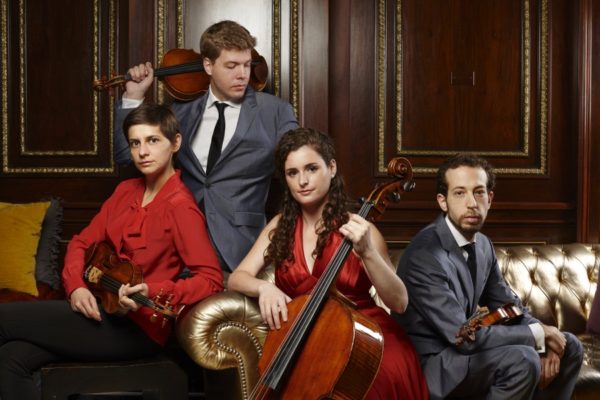
and violinist Gershon Gerchikov. (Photo courtesy Ariel Quartet)
In our world, where some voices drown out many others, chamber music offers an example of productive collaboration toward an elusive goal.
“The art is at the center,” says Rojansky. “That’s the thing that is being crafted and worked on. It’s through that act that we grow as human beings. It teaches us about teamwork and community building. It’s what life on Earth is all about.”
With successful teamwork, chamber music becomes uniquely joyful. The Mendelssohn Octet harnesses the energy and grandness of a symphony.
Mendelssohn was just 16 years old when he composed the piece as a birthday present for his violin teacher. “It is a big party,” says Grüning. A soaring melody, light and innocent, makes its way through the first movement, usually in the first violin, but also in the other parts. The middle voices weave a rhythmic carpet. Variations of Mendelssohn’s big idea shift the mood from giddy to wary, startling to soothing, and, in the end, to a dizzying and triumphant manifestation of childish glee.
Copland’s “Appalachian Spring,” originally written to accompany a ballet by Martha Graham, has become a symbol of distinctly American composition. In the ballet, a young couple engage with life in the Pennsylvania hills. The chamber version exudes a warmth and energy that seem more intimate than in Copland’s 1970 adaption for a full orchestra.
Both pieces call for larger-than-standard chamber ensembles like trios, quartets, and quintets and require high levels of cooperation, communication, and focus.
You don’t have to play an instrument or have experience with classical music to appreciate the art, says Grüning. The Ariel Quartet has done hundreds of outreach programs, performing chamber music in schools all over the U.S. “We’ve found that, a lot of the time, kids who hadn’t been exposed to classical music before responded incredibly well to the music,” he says. “A lot of people won’t drag their five-year-old to see a classical music concert on a Friday at 8 p.m. We are trying to reach out and make this music more accessible because we have seen that the kids love it.
“Like good theater, or good books, classical music is very powerful,” he adds. “It is something that happens in front of you and happens to you.”
“It’s some of the greatest music ever written,” says Jonathan Ong, first violinist of the Verona Quartet. “When people come to the concert, they’ll experience both a slice of history and art that’s being created in the present. I think it’s a very special moment when those things coincide.”
Grüning — whose 4½-year-old daughter might come “if she feels like it” — says the energy during performances is something physical. “To hear live chamber music in a concert is something that leaves listeners in a changed state,” he says.
Rojansky hopes the audience will have a feeling like the one she had during rehearsal.
“I hope they’ll get so drawn in that they forget about the world around them, whatever’s been going on in their lives,” she says. “I hope they’re just in it, experiencing the music in the moment.”
Felix and Aaron
The event: Mendelssohn Octet and Copland’s “Appalachian Spring”
The time: Friday, Aug. 5, 5 p.m.
The place: Wellfleet Congregational Church, 200 Main St.
The cost: Adults $55; students $15; children under 18 free
By Dorothea Samaha

